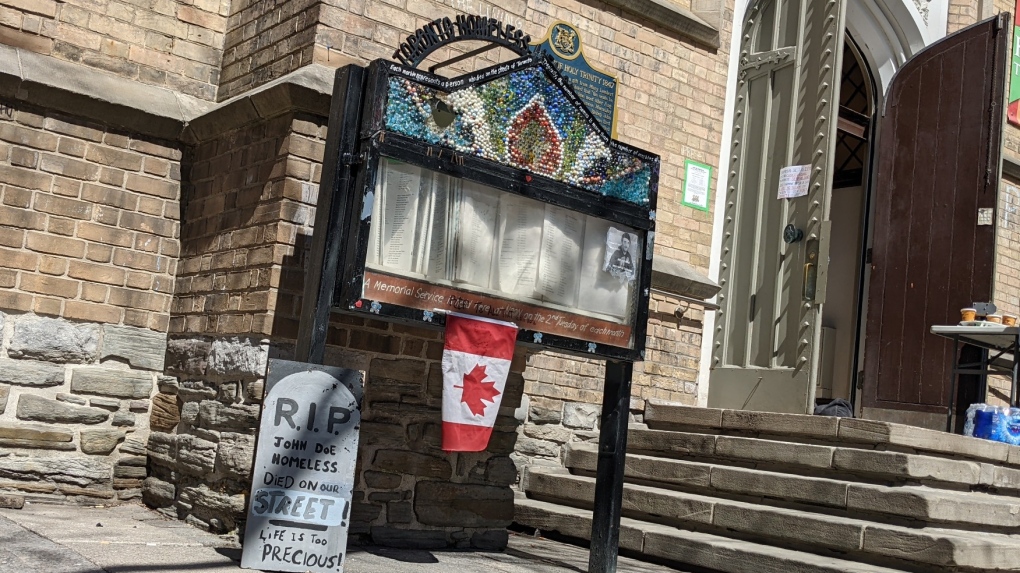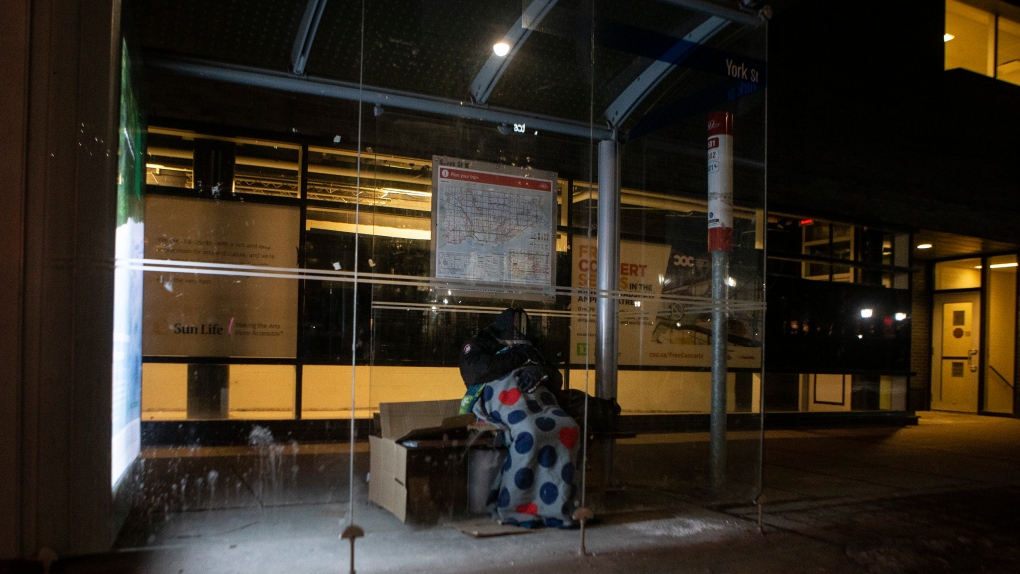'It doesn't have to be this way,' Shelter deaths in Toronto top 100 for second consecutive year
 The Toronto Homeless Memorial remembers those who have died as a result of homelessness in Toronto. (Joanna Lavoie photo)
The Toronto Homeless Memorial remembers those who have died as a result of homelessness in Toronto. (Joanna Lavoie photo)
For the second consecutive year, more than 100 people have died while staying at a Toronto shelter.
The latest data, which was recently released, shows 110 unhoused individuals – 81 men, 29 women – passed away while staying in a Toronto shelter in 2022. The average age of those who died is 51.
- Download our app to get local alerts on your device
- Get the latest local updates right to your inbox
This is slightly down from 2021, which saw 132 shelter resident deaths in the city. That year, the average age of those who died was 47.
But it is still an alarmingly high tally, advocates for the homeless say.
“110 is still way too many,” street pastor Doug Johnson Hatlem, of Sanctuary Ministries, told CP24.com. “This is a city, a country where if we put our minds to it we could have zero shelter deaths.”
Since 2010, Johnson Hatlem has helped organize the Toronto Homeless Memorial, which is held on every second Tuesday of the month outside downtown’s Church of the Holy Trinity.
He said many of the people he and his team have added to the growing tribute were shelter residents.
“It’s really significant the number of people that died before their time on the street. These latest numbers show that homelessness is a death sentence in Toronto,” Johnson Hatlem said.
‘IT DOESN’T HAVE TO BE THIS WAY’
While there were 110 deaths involving shelter residents in Toronto in 2022, it should be noted that another 92 unhoused individuals died in the city last year.
That pushed the total number of deaths involving underhoused individuals to above 200 for the second straight year.
Lisa LeBlanc has lived in Toronto shelters for the last eight years.
She said she’s known of dozens of people who have passed away during that time, including at least five people in the last year at the shelter-hotel she calls home in downtown Toronto.
“Sadly, there’s a lot that goes on here. They don’t really tell people what’s going on, but we hear rumours through the grapevine. … One death is too many,” she told CP24.com during a recent interview.
She said that one of those individuals was a woman who was “loved by everyone.” Her death was “really traumatizing,” for a lot of people in the shelter, she said.
“It’s so sad. It’s unfortunate because it doesn’t have to be this way,” LeBlanc said, adding a lot of those who died accidentally overdosed on drugs, which many use to cope with the trauma and mental health challenges they deal with every day.
“I know it’s hard, but it shouldn’t be this hard. People don’t choose to be homeless or in a shelter.”
LeBlanc said while the best solution is to get people good, affordable housing with supports, treating unhoused people with more kindness, empathy, and understanding would go a long way.
“This experience has changed my life and not for the better. … It’s no way to live,” she said.
 A homeless man sleeps in a bus shelter, in Toronto, on Friday, March 11, 2022. THE CANADIAN PRESS/Chris Young
A homeless man sleeps in a bus shelter, in Toronto, on Friday, March 11, 2022. THE CANADIAN PRESS/Chris Young
INCREASE IN DRUG TOXICITY COULD BE TO BLAME FOR HIGH NUMBER OF DEATHS
In a statement provided to CP24.com, City of Toronto spokesperson Anthony Toderian said the municipality is “deeply saddened by all deaths of people experiencing homelessness both in and outside of the city's shelter system.”
Toderian, however, said that an increase in drug toxicity continues to result in an uptick in shelter deaths.
“Rates of non-fatal and fatal opioid poisoning remain consistently high. The unregulated drug supply is increasingly toxic and unpredictable. From January to September 2022, 59 per cent of deaths in homeless service settings were due to confirmed or suspected overdoses,” he said.
In December 2020, the city in partnership with community agencies launched the “multi-pronged” Integrated Prevention and Harm Reduction Initiative (iPHARE) to address opioid-related deaths in Toronto’s shelter system.
Last year, the program provided more than $9 million in funding for a range of harm reduction supports, including placing embedded harm reduction workers or visiting harm reduction outreach workers at 23 shelters, respites and shelter hotel locations identified as priority sites based on overdose data.
Toderian said that the good news is that while 2022 saw increased demand for shelter services compared to 2021, that didn’t result in an increase in the number of deaths of shelter residents.
“This demonstrates that shelter policies and harm reduction initiatives are making an impact and helping to save lives,” he said.
Progress, however, appears to be slow.
To that end, Toderian said the city is “urging the provincial and federal governments to allocate additional funding for long-term investments to address the scale of need for mental health, harm reduction and treatment resources.”
Toronto’s Shelter, Support and Housing Administration Division has collected data on shelter deaths since 2007 and conducts an annual review.
That first year, there were 24 deaths recorded in Toronto’s shelters.
By 2019, the number of people who died in the system reached 48.
The following year, in 2020, when the pandemic began, shelter deaths jumped to 74.
Since then, more than 100 people have died in Toronto’s shelters each year.
CTVNews.ca Top Stories

Quebec nurse had to clean up after husband's death in Montreal hospital
On a night she should have been mourning, a nurse from Quebec's Laurentians region says she was forced to clean up her husband after he died at a hospital in Montreal.
Northern Ont. lawyer who abandoned clients in child protection cases disbarred
A North Bay, Ont., lawyer who abandoned 15 clients – many of them child protection cases – has lost his licence to practise law.
Bank of Canada officials split on when to start cutting interest rates
Members of the Bank of Canada's governing council were split on how long the central bank should wait before it starts cutting interest rates when they met earlier this month.
'It was instant karma': Viral video captures failed theft attempt in Nanaimo, B.C.
Mounties in Nanaimo, B.C., say two late-night revellers are lucky their allegedly drunken antics weren't reported to police after security cameras captured the men trying to steal a heavy sign from a downtown business.
Cuban government apologizes to Montreal-area family after delivering wrong body
Cuba's foreign affairs minister has apologized to a Montreal-area family after they were sent the wrong body following the death of a loved one.
What is changing about Canada's capital gains tax and how does it impact me?
The federal government's proposed change to capital gains taxation is expected to increase taxes on investments and mainly affect wealthy Canadians and businesses. Here's what you need to know about the move.
'Anything to win': Trudeau says as Poilievre defends meeting protesters
Prime Minister Justin Trudeau is accusing Conservative Leader Pierre Poilievre of welcoming 'the support of conspiracy theorists and extremists,' after the Conservative leader was photographed meeting with protesters, which his office has defended.
'One of the single most terrifying things ever': Ontario couple among passengers on sinking tour boat in Dominican Republic
A Toronto couple are speaking out about their 'extremely dangerous' experience on board a sinking tour boat in the Dominican Republic last week.
Boeing's financial woes continue, while families of crash victims urge U.S. to prosecute the company
Boeing said Wednesday that it lost US$355 million on falling revenue in the first quarter, another sign of the crisis gripping the aircraft manufacturer as it faces increasing scrutiny over the safety of its planes and accusations of shoddy work from a growing number of whistleblowers.
































